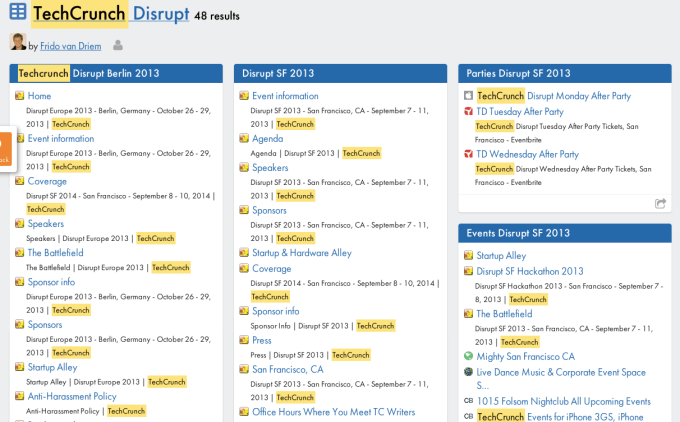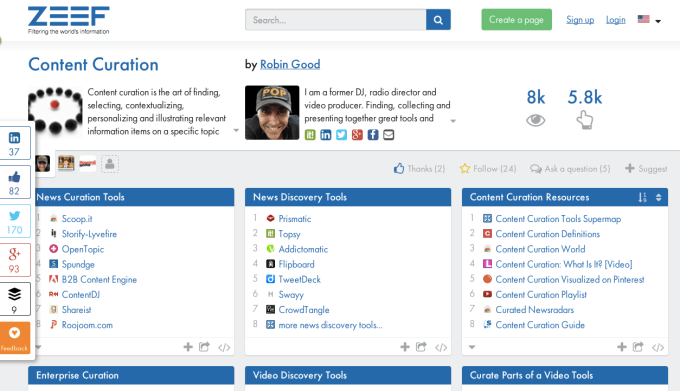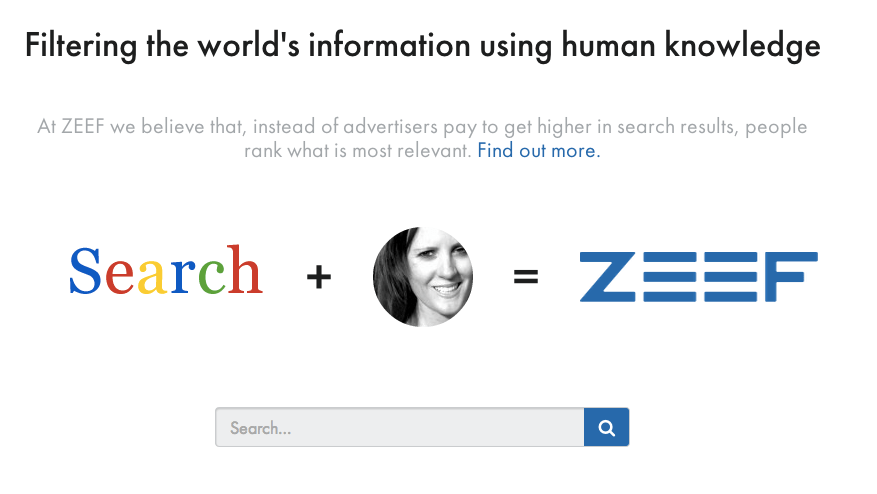European startup Zeef has closed a $1.55 million Series A funding round to grow its crowdsourced content curation platform. We first came across the company exhibiting at TechCrunch’s startup alley back in September 2013.
Zeef has previously raised around $830,000 in total in FFF and seed funding. Investors in the new round are angels with online marketing experience, according to the startup. It said it plans to use the new funding to invest in product, with mobile and location-based search on its to-do list, and for expanding its commercial operations in the U.S. — by opening a New York office.
Zeef’s philosophy is that online search is better with a human layer atop it, helping to filter results and hand-pick the best bits. So dodge the ads, beat the spammy SEO, and escape your personal filter bubble type thing.
It’s not, of course, the first company to try and beat clinical info-organizing algorithms with a human element. For instance there was the Wikia crowdsourced search project, backed by Jimmy Wales, which deadpooled in 2009. While Jason Calacanis’ Mahola, another human-powered search effort, was founded way back in 2007 but has morphed beyond that after a series of pivots.
Evidently Zeef reckons there’s growing appetite for a modicum of human-powered curation to help people navigate the omnipresent algorithmic filter bubbles. The crowdsourced knowledge startup was founded at the start of last year.
Do a search on Zeef and instead of algorithmically generated results you’re presented with link directories created by other users who have spent time figuring out which links are sensible/useful on a particular topic.
Here’s an example of one Zeef user’s curated list which pops up when you search for ‘TechCrunch’, for instance — it’s actually a curated list of links relating to TechCrunch Disrupt, and a little out of date too… But if you were looking for an overview of a past year’s Disrupt it might actually be quite useful to have all this content bundled up in one place:

Zeef puts the emphasis on the individual who is curating a list — showing their profile, along with page views and clicks generated, to allow others to judge whether they value this particular person’s curated list.
Here’s another example of a Zeef curator:

“Zeef allows multiple curators to compete on the same subject,” says a spokeswoman, discussing the difference between Zeef and other human-powered search startup efforts. “Pages about a subject are ranked by quality metrics and not influenced by search marketing or payments.
“Normal directories/search engines have a focus on individual links which are tagged and grouped by subject, we have a focus on an entire overview of links about a subject by one person to give a complete overview of each individual person’s view.”
There is a fly in this anti-SEO online search ointment, though: Zeef’s business model is based on affiliate links, rather than advertising.
And while it claims it does not rank lists based on the number of affiliate links within them, curators wanting to generate higher commission for themselves — there is a revenue share going on to incentivize curators to curate for Zeef — might decide to lard their lists with affiliate links if they want to boost their own commission.
So really there are ads on Zeef, they’re just not as easy to spot as on other search engines.
What’s Zeef’s fix for preventing ‘curated’ lists from becoming overly spammy? It claims competition from other human curators will drive out egregious commission-seekers.
“Transparency and competition will safeguard the quality of information: our platform allows a multitude of curators per subject. This encourages curators not to sacrifice quality of information for commissions, as people would pick up on this and favour another curator,” is how it argues this on its website.
Curators get a 50:50 revenue share of any affiliate link commission driven from Zeef’s own platform. If they embed their lists — in widget form — elsewhere, the revenue share skews 75:25 in the curators’ favor.
So is human-powered commission-fueled affiliate link list curation going to reform online search for the better? Well, that’s for you to judge.






























Comment